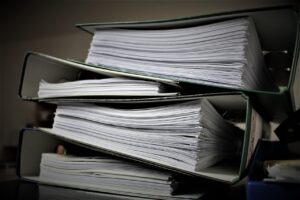
Money is something that we all have to deal with in our lives, but it can be tough to stay organized and on top of everything when it comes to our finances. In this blog post, we will give you some tips on how to be better organized with your money and your finances. We will cover everything from creating a budget to using technology for financial organization. So, whether you are looking for help getting started or want some more advanced tips, read on for useful information!
Here is the list of useful tips to be better organized:
- Create a budget
- Class savings as fixed outgoings
- Pay your bills on time
- Avoid bank charges
- Keep a good credit report
- Be organized with your paperwork
- Use technology
- Be aware of fraud
- Prioritize your debt
- Have an emergency fund
Create a budget
Creating a budget is one of the most important things you can do to get your finances in order. When you create a budget, you are essentially creating a plan for how you will spend your money. This can help you stay on track and avoid overspending. There are many ways to create a budget, so find one that works best for you. Some people prefer to use a paper-based system, while others prefer online tools. One great option is to use a salary exchange calculator for creating your budget. No matter which method you choose, make sure that it is realistic and that you are able to stick to it.
Class savings as fixed outgoings
When you are trying to get your finances in order, it is important to classify your expenses as either fixed or variable. Fixed outgoings are expenses that will not change, such as rent or car payments. Variable outgoings are expenses that can change, such as groceries or gas. When you know which expenses are fixed and which ones are variable, you can be better prepared for when your monthly budget inevitably changes. For example, if you know that your groceries always cost the same amount each month, then you can plan for this expense to be a part of your monthly budget. But if you know that your gasoline bill varies from month to month, then you will need to account for this when creating your budget.
Pay your bills on time
Paying your bills on time is another important way to stay organized with your finances. When you pay your bills on time, you avoid late fees and keep your credit score healthy. In order to make sure that you never miss a bill payment, set up automatic payments or create a calendar reminder so that you never forget.
Avoid bank charges
Many people find it difficult to stay organized with their finances because they are constantly dealing with bank charges. Bank charges can include things like overdraft fees, monthly maintenance fees, and ATM fees. To avoid these charges, be mindful of how much money you have in your account and try not to use your debit card for unnecessary purchases.
Keep a good credit report
A good credit report is essential for getting approved for a loan or a mortgage. If you want to be better organized with your finances, it is important to work on maintaining a good credit score. There are many things you can do to improve your credit score, such as paying your bills on time and keeping your debt levels low.
Be organized with your paperwork

When you are trying to stay organized with your finances, it is important to keep all of your paperwork in one place. This includes bank statements, credit card bills, and receipts for any purchases you have made. By keeping all of your financial documents together, you make it easy to track your expenses and see where you can make cuts.
Use technology
Many people find that using technology can be a helpful way to stay organized with their finances. There are many types of technology that can be used for this purpose, such as budgeting apps, financial tracking apps, and even password managers. Using technology can help you automate tasks like bill paying and budgeting, which makes it easier to stay on top of your finances.
Be aware of fraud and protect your money
One of the biggest challenges people face when trying to stay organized with their finances is protecting themselves from fraud. Fraud can come in many forms, such as credit card scams, identity theft, and phone scams. To protect yourself from fraud, it is important to be aware of what to look for and how to safeguard your information. You can do this by staying up-to-date on the latest scams, being careful about where you share your personal information, and using strong passwords for all of your online accounts. By taking these precautions, you can help reduce the risk of becoming a victim of fraud.
Prioritize your debt
If you want to be better organized with your finances, one of the things you need to do is prioritize your debt. This means making a plan for how you will pay off your debts and sticking to it. One way to make this easier is to break your debt down into different categories, such as credit card Debt, car loans, student loans, etc. This will help you focus on specific debts and come up with a plan for how to pay them off. Another thing you can do is make extra payments towards your highest interest rate debt. By doing this, you can save money on interest charges and get out of debt faster.
Have an emergency fund
One of the best ways to stay organized with your finances is to have an emergency fund. An emergency fund is a savings account that you can access when needed to cover unexpected expenses. It is important to have an emergency fund because it can help you avoid going into debt when something unexpected comes up.
There are many ways to build an emergency fund. Some people choose to save their money until they have enough to cover three months’ worth of expenses. Others may choose to invest their money in a high-yield savings account or a certificate of deposit (CD). No matter what method you choose, it is important to stick with it, so you can build up a cushion for emergencies.
When deciding how much money to put into your emergency fund, it is important to remember that everyone’s situation is different. You may need more or less money in your emergency fund, depends on your lifestyle and income. It is important to be realistic about how much you can save each month and not put too much or too little into your fund.
By having an emergency fund, you can rest easier knowing that you have a cushion to fall back on if something unexpected comes up. This can help you stay organized with your finances and avoid going into debt.
In conclusion, there are many things you can do to stay organized with your finances. By creating a budget, paying your bills on time, and avoiding bank charges, you can make it easier to manage your money. You can also protect yourself from fraud by being aware of the latest scams and using strong passwords for all of your online accounts. And finally, by having an emergency fund, you can rest easier knowing that you have a cushion to fall back on if something unexpected comes up. Follow these tips, and you will be able to better manage your money and stay out of debt.


































